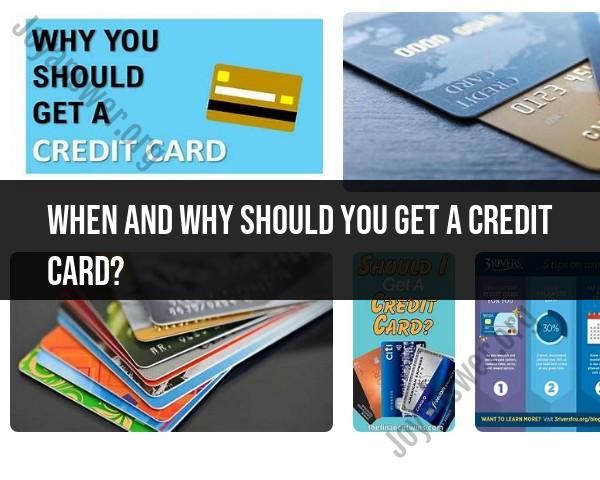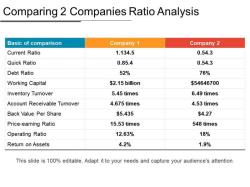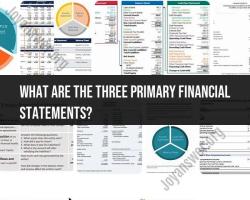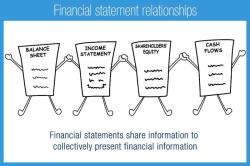When and why should you get a credit card?
Getting a credit card can be a valuable financial tool when used responsibly. Here are some common situations when and reasons why you might consider getting a credit card:
When:
Building Credit: One of the most common reasons to get a credit card is to establish and build your credit history. A good credit history is important for various financial activities, including applying for loans, renting an apartment, and sometimes even getting a job.
Emergencies: Having a credit card can provide a financial safety net in case of unexpected emergencies, such as medical expenses, car repairs, or home repairs. It can help you cover costs when you don't have immediate cash on hand.
Online Shopping: Credit cards are often the preferred payment method for online shopping. They offer security features like fraud protection, and they can make it easier to track your online purchases.
Travel: Credit cards, especially those designed for travelers, can provide benefits such as travel rewards, insurance coverage, and the ability to make reservations and rental car bookings.
Convenience: Credit cards offer convenience and flexibility for making everyday purchases. They can reduce the need to carry cash and provide a record of your transactions.
Why:
Building Credit: A credit card is an excellent tool for establishing and improving your credit score, as responsible use and on-time payments can have a positive impact on your credit history.
Credit Card Rewards: Many credit cards offer rewards programs that can provide cashback, travel rewards, or other perks for your spending. These rewards can be valuable if you use your card wisely.
Emergency Fund: While not a substitute for a dedicated emergency fund, a credit card can serve as a backup source of funds in case of unexpected expenses.
Consumer Protections: Credit cards often come with consumer protection features, including purchase protection, extended warranties, and fraud liability protection.
Convenience and Security: Credit cards offer a convenient and secure way to make payments. They are widely accepted, and many offer features like contactless payments and chip technology for added security.
Interest-Free Grace Period: When you pay your credit card balance in full by the due date, you can take advantage of the interest-free grace period, which means you won't incur interest charges on your purchases.
It's important to note that while credit cards offer numerous benefits, they also come with potential downsides, such as the risk of accumulating debt and paying high interest rates if you carry a balance. Therefore, it's crucial to use credit cards responsibly, pay your bills on time, and avoid overspending to fully enjoy their advantages while minimizing potential drawbacks.
When and Why You Should Get a Credit Card
You should get a credit card when you are financially responsible and understand the terms and conditions of credit card use. A credit card can be a valuable tool for building credit, earning rewards, and making purchases. However, it is important to use credit cards responsibly and avoid overspending.
Here are some reasons why you might want to get a credit card:
- To build credit: A credit card can help you to build credit by demonstrating your ability to borrow money and repay it on time. This can be helpful when you apply for a loan or mortgage in the future.
- To earn rewards: Many credit cards offer rewards programs that can help you save money on travel, gas, groceries, and other purchases.
- To make purchases: A credit card can be a convenient way to make purchases, especially online or over the phone. You can also use a credit card to rent a car or book a hotel room.
Benefits and Drawbacks of Having a Credit Card
Benefits:
- Build credit
- Earn rewards
- Convenient way to make purchases
- Purchase protection
- Fraud protection
- Travel benefits
Drawbacks:
- Interest charges
- Annual fees
- Late payment fees
- Overspending temptation
- Potential for fraud
Types of Credit Cards and Their Uses
There are many different types of credit cards available, each with its own unique features and benefits. Some of the most common types of credit cards include:
- Rewards credit cards: These cards offer rewards programs that allow you to earn points or miles on your purchases, which can be redeemed for travel, merchandise, or statement credits.
- Cash back credit cards: These cards give you a percentage of your purchases back in cash, which can be credited to your account or redeemed for a statement credit.
- Balance transfer credit cards: These cards allow you to transfer the balance from other credit cards to a new card with a lower interest rate. This can help you save money on interest charges.
- Student credit cards: These cards are designed for students who are new to credit. They typically have lower credit limits and interest rates than other types of credit cards.
- Secured credit cards: These cards require a deposit, which serves as your credit limit. Secured credit cards are a good option for people with bad credit or no credit history.
Building Credit and Managing Finances with a Credit Card
To build credit and manage your finances with a credit card, it is important to:
- Make all of your payments on time and in full.
- Keep your credit utilization low. This means using less than 30% of your available credit limit.
- Pay off your balance each month to avoid interest charges.
- Only open new credit accounts when you need them.
Tips for Responsible Credit Card Usage
Here are some tips for responsible credit card usage:
- Create a budget and track your spending. This will help you to avoid overspending on your credit card.
- Only charge what you can afford to pay back each month.
- Be aware of the interest rates and fees associated with your credit card.
- Shop around for the best credit card interest rates and terms.
- Review your credit card statements carefully each month.
- Report any lost or stolen credit cards immediately.
By following these tips, you can use credit cards responsibly and reap the benefits that they offer.












